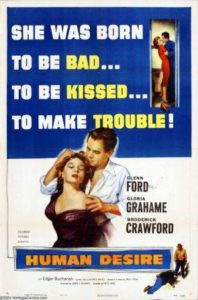A rarity on the screen… a RAW slice of life!
By 1954 most would say that Fritz Lang’s finest work was behind him, even though he had just come off a surprisingly effective noir thriller in The Big Heat, starring Glenn Ford and Gloria Grahame. For his follow up to Heat, Lang chose another noir topic and again was reunited with Ford and Grahame. This next pairing of the three was Human Desire, taken from the Emile Zola novel and itself a remake of an earlier version directed by Jean Renoir in 1938 entitled La Bete Humaine.
Most who have seen both find Lang’s version to be the inferior of the two. However as this review is unfamiliar with both the book and Renoir’s version, we will look at Human Desire on its own merits. With this ignorance, there is quite a bit to recommend it.
Glenn Ford, a rather stoic actor who is extremely good in roles that fit his limited range, is Jeff Warren, a veteran just back from the Korean Conflict. His only dream is to return to a life of normalcy, which includes returning to his job as a brakeman on the railroad. He gets his old job back and stays in the home of a friend and coworker Alec Simmons. Incidentally, Simmons has a young daughter (Ellen, played by Kathleen Case) who is absolutely smitten with Jeff. Jeff flirts back but seems uninterested in taking it any further.
In a corollary plot, Carl Buckley (Broderick Crawford) another railroadman, has just been fired. A despondent drunk, Carl pleads his case with his wife Vicki (Gloria Grahame), begging her to use her influence with an old family friend of hers, Mr. Owens. Reluctantly she agrees and after her meeting with Owens behind closed doors Carl gets his job back. As an added bonus, Carl keeps a note which incriminates Vicki. He holds on to it to blackmail her.
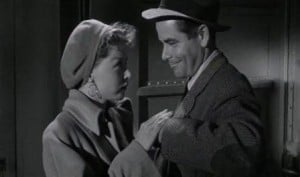 But we get the impression that Vicki may have had to resort to more intimate means to get Carl his second chance, a impression that Carl has as well. As his drinking and paranoia increase, he finally decides to act, killing Owens in a rage on a train- with Vicki in complete tow. Needing to ensure their escape. Carl sends Vicki to clear the way.
But we get the impression that Vicki may have had to resort to more intimate means to get Carl his second chance, a impression that Carl has as well. As his drinking and paranoia increase, he finally decides to act, killing Owens in a rage on a train- with Vicki in complete tow. Needing to ensure their escape. Carl sends Vicki to clear the way.
Almost by design, Vicki encounters Jeff smoking in the corridor, and quickly befriends him. Before we know it, Jeff is in a full fledged affair with Vicki. In such a small town, word travels fast and Carl learns of his wife’s dalliances, but does nothing about it except increase his drinking.
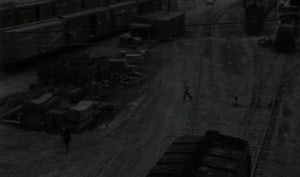 As Jeff and Vicki get progressively closer, she finally shares her desire to be rid of Carl, asking Jeff to murder her husband. He agrees but after following him through the train-yards (in an excellent overhead dolly sequence), Jeff is unable to complete the deed. Instead, finding him drunk, Jeff takes Carl to the yard house to have him sobered up, but not before going through his pockets and finding the letter Carl’s been blackmailing Vicki with throughout.
As Jeff and Vicki get progressively closer, she finally shares her desire to be rid of Carl, asking Jeff to murder her husband. He agrees but after following him through the train-yards (in an excellent overhead dolly sequence), Jeff is unable to complete the deed. Instead, finding him drunk, Jeff takes Carl to the yard house to have him sobered up, but not before going through his pockets and finding the letter Carl’s been blackmailing Vicki with throughout.
Finally realizing (or thinking?) that Vicki has played him for the fool all along, Jeff confronts her and tells her it is over. She begs for him to stay but he refuses, dropping the letter on a table as he leaves her life forever. Jilted and alone, Vicki leaves town, boarding a train on which (unbeknownst to her) Jeff is working. After settling into her compartment, Carl barges in, begging her to take him back, admitting that he no longer has anything to offer her. As she stares back at him- somewhat stupefied- he offers even to return the letter to her.
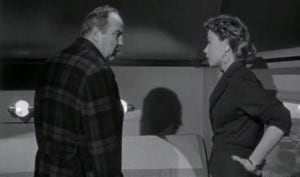 Finally with Jeff no longer around to do her dirty work, Vicki flares to life, telling Carl in point blank terms that he no longer has the letter – in fact he has nothing. Not her, not a job (he’s been fired again), and no clue. Enraged, Carl confronts her, throttling her until she collapse dead on the compartment floor. Ironically, the compartment looks identical to the one in which Owens himself was killed, completing the circle.
Finally with Jeff no longer around to do her dirty work, Vicki flares to life, telling Carl in point blank terms that he no longer has the letter – in fact he has nothing. Not her, not a job (he’s been fired again), and no clue. Enraged, Carl confronts her, throttling her until she collapse dead on the compartment floor. Ironically, the compartment looks identical to the one in which Owens himself was killed, completing the circle.
While Vicki breathes her last, Jeff sits in the engine with a quiet smile across his face, perhaps contemplating the upcoming dance for which he has tickets. Perhaps he will take Ellen, with whom he’s had a tumultuous and emotional finale scene with. In a melodramatically awful scene, Ellen bares her soul to Jeff, with tears running down her face, but to no avail. Jeff’s still- presumably- clueless.
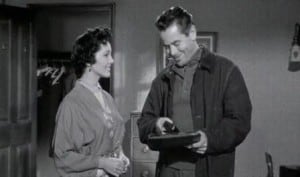 What Lang’s version may lack (presumably) it must make up in atmosphere and cinematography. Many of the shots are geometrically odd to say the least, with odd shapes jutting into the frame (often a triangle it seems), and the all too present images of trains, tracks and switches. Most impressive are the shots taken from the cowcatcher (as if these trains had one) of the rails as the engine travels ahead at breakneck speed. If there is any downfall to the proceedings, it is perhaps an over-reliance on stock train footage. Not only does the quality of the stock footage suffer in comparison, but it is also mostly superfluous.
What Lang’s version may lack (presumably) it must make up in atmosphere and cinematography. Many of the shots are geometrically odd to say the least, with odd shapes jutting into the frame (often a triangle it seems), and the all too present images of trains, tracks and switches. Most impressive are the shots taken from the cowcatcher (as if these trains had one) of the rails as the engine travels ahead at breakneck speed. If there is any downfall to the proceedings, it is perhaps an over-reliance on stock train footage. Not only does the quality of the stock footage suffer in comparison, but it is also mostly superfluous.
As to the casting, it is hard to argue with the choices. Ford is everyman’s everyman, which is exactly what Jeff calls for. Grahame is almost devilishly good as the oppressed and / or vindictive wife. Broderick Crawford is almost beside himself in his various drunken stupors, though making his descent into oblivion all the more believable- though it seems hard to believe that such a drunken sot could engage successfully with someone like Vicki. Unless…
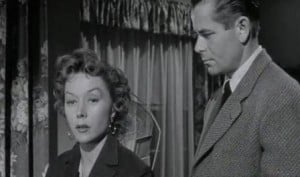 The final question comes down to Vicki. Is she the oppressed and perhaps victimless wife the first two-thirds of the film depict or is she the more diabolical shrew that comes to light in the final reels? For me, anyway, the Vicki’s shift was as unexpected as it was dramatic. There’s also some of Vicki’s revelations toward the end of the film (mainly regarding Owens) that indicate some deeper seeded psychological issues.
The final question comes down to Vicki. Is she the oppressed and perhaps victimless wife the first two-thirds of the film depict or is she the more diabolical shrew that comes to light in the final reels? For me, anyway, the Vicki’s shift was as unexpected as it was dramatic. There’s also some of Vicki’s revelations toward the end of the film (mainly regarding Owens) that indicate some deeper seeded psychological issues.
Well done, Mr. Lang. Whether intentional or not, the change in perception of Vicki struck me as a curveball, and as the curtain fell I wanted to see more.
